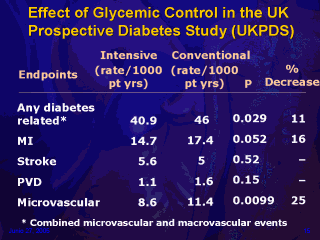| front |1 |2 |3 |4 |5 |6 |7 |8 |9 |10 |11 |12 |13 |14 |15 |16 |17 |18 |19 |20 |21 |22 |23 |24 |25 |26 |27 |28 |29 |30 |31 |review |
 |
The UK
Prospective Diabetes Study (UKPDS) compared the benefits of intensive
glycemic control versus conventional glycemic control in reduction of
diabetes-related endpoints. The major benefit was in the reduction of
microvascular endpoints. Myocardial infarction was reduced by 16%, but this
reduction did not achieve statistical significance. There was no
statistically significant reduction in the incidence of stroke or peripheral
vascular disease in the intensively treated group compared with the group
treated with conventional glycemic control. UKPDS showed that glycemic
control management in the context of a clinical trial did not necessarily
result in the reduction of macrovascular events, but primarily reduced
microvascular endpoints in patients with diabetes. Reference: UK Prospective Diabetes Study (UKPDS) Group. Intensive blood-glucose control with sulphonylureas or insulin compared with conventional treatment and risk of complications in patients with type 2 diabetes (UKPDS 33). Lancet 1998;352:837-853. |